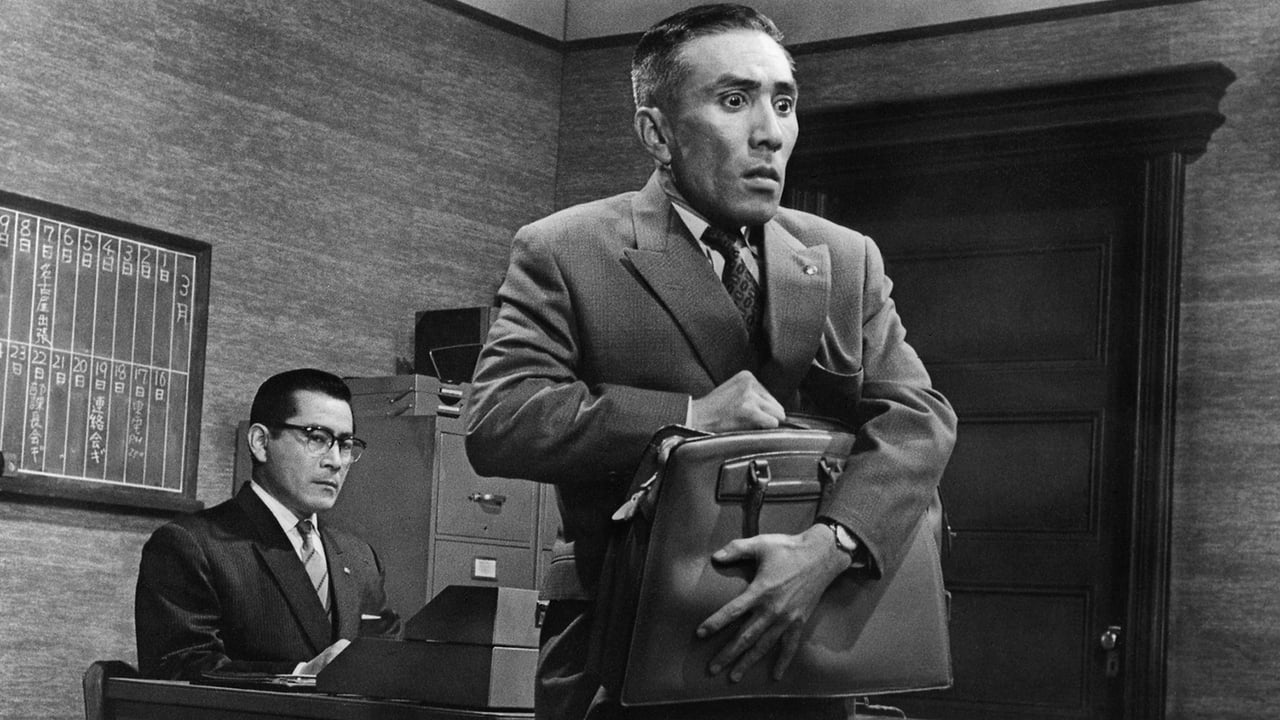

THE BAD SLEEP WELL is a crime drama about corruption, greed and responsibilities in a post-war Japanese corporation. This movie is a kind of contrast of American political noirs, which have dealt with similar themes.The news reporters comment and gossip at a wedding of a daughter of a Vice President in a famous corporation. The police interrupt the wedding when a corporate assistant officer is arrested on charges of bribery. This incident is similar to an earlier scandal after which, an Assistant Chief has committed suicide. Following the wedding, the police question a corporate assistant officer and an accountant about their bribery of government officials. After police investigation, one of them commits murder. The second was saved by a mysterious avenger...This is a tragic story in a corporate policy and corrupt society. Mr. Kurosawa, given the style and themes of the film, has introduced a serious farce. He has threw a dose of an inopportune and cynical humor in the story. An avenger is a discreetly face from behind. This concept is definitely brilliant. The director has palliated disturbing scenes with a touch of political irony. However, the pace and direction are quite slow, so the film becomes boring in the second part. It is also the biggest flaw in the film.The characterization is excellent, because Mr. Kurosawa did not kill humanity in his characters. Toshiro Mifune (Kōichi Nishi) is a clumsy groom as an avenger from the shadow. This is, regardless of duality in his character, a pale performance of Mr. Mifune. Love is a disturbing factor in his case. It is the highlight of cynicism. His greatest weakness and his salvation at the same time is Yoshiko (Kyōko Kagawa), the daughter of his greatest enemy and his wife. Antagonists, Takashi Shimura (Moriyama), Kō Nishimura (Shirai) are tragicomic. Masayuki Mori (Public Corporation Vice President Iwabuchi) is very convincing as the basis of corruption. Kamatari Fujiwara (Chief Wada) is a penitent who has risen.End of the film is quite dark. The great evil has won, but every victory has its price.
... View MoreI enjoyed Akira Kurosawa's medieval adaptations of Shakespeare (Ran, Throne of Blood), as well as his contemporary thriller, High and Low, but I have to say this contemporary thriller adaptation of Hamlet is the weakest of the bunch.Not to say it's bad - it was still a great watch, just that it was way too long at 151 minutes. It's pretty amazing how Kurosawa made such a contemporary movie back in 1960 that it still feels fresh today. His direction is mostly tight and suspenseful and the movie is further augmented by an effective score and good acting all around, especially by Kurosawa stalwart, Toshiro Mifune.But overly long it is, and less interesting scenes had my attention wandering. Maybe I should blame Shakespeare instead. Gawd knows I already find him long-winded and boring.
... View MoreAkira Kurosawa's 1960 black and white film, The Bad Sleep Well (Warui Yatsu Hodo Yoku Nemuru), is often compared to William Shakespeare's Hamlet, but it's an inapt comparison for, while Shakespeare's play has a higher sense of poetry, Kurosawa's film has far more relevance, realism, and complexity, even if, like Hamlet, it's a high class melodrama. The film was written by Kurosawa and four collaborators- Shinobu Hashimoto, Eijirô Hisaita, Ryuzo Kikushima, and Hideo Oguni. Because it has Shakespearean pedigree, and is not set in medieval Japan, this film has not gotten its proper due, in comparison with the classics that Kurosawa made earlier in his career, such as Rashomon, Ikiru, and Seven Samurai. But, it should, for, despite its melodramatic bent, and film noir roots- heightened by Masaru Sato's wonderful soundtrack, which alternates the darkness of certain moments with almost carnivalesque music, the film is superbly paced and well written, for within the film's opening sequences at a corporate wedding, fully Westernized with a Here Comes The Bride rendition, covered by the jackal-like press- reminiscent of the paparazzi in the prior year's Federico Fellini masterpiece La Dolce Vita, ready to pounce on any irregularity, because of a budding scandal, and the subsequent brilliant montage of newspaper headlines that puts those used by Hollywood in pre-World War Two gangster films to shame, the bulk of the film's narrative setup is displayed, and allowed to unravel for the next two hours, albeit almost never following the standard melodramatic arc of allowing the characters' dumbest possible actions dictate the plot. Because of this, the film's ending is both realistic, and one of the most chilling in film history. Perhaps only Dr. Strangelove's scenes of Armageddon are more chilling, however leavened by that film's final scenes' editing.The cinematography, by longtime Godzilla series mainstay Yuzuru Aizawa, is superb. The scenes where Nishi and Wada drive Shirai mad are masterful example of pure black and white cinematography that rivals the best of the masterful Carl Theodor Dreyer. And while all the acting is first rate by the supporting cast, with the usual stellar work of Takashi Shimura as Moriyama, the perfectly restrained evil of Masayuki Mori as Iwabuchi, not to mention the wonderfully over the top looniness of Kô Nishimura as Shirai, the stellar cravenness of Kamatari Fujiwara as Wada, the semi-incestuous off kilter performance of Tatsuya Mihashi as Tatsuo, and the hammy enigmatic performance of Takeshi Katô as Itakura (the real Nishi), this film belongs to Toshirô Mifune as Nishi (the real Itakura), for, unlike his wildly over the top-however terrific, work in Rashomon and Seven Samurai, he truly gets to display the full range of his acting chops in his boiling rages- he declares, when trying to toss Shirai out the same window his father fell from, 'Even now they sleep soundly, with grins on their faces. I won't stand for it! I can never hate them enough!', his hiding of them as a corporate secretary, his acts of kindness that ultimately do him in, and in his love tenderly restrained scenes with Yoshiko, especially one where he tells of how his obsession with his father after his death is only matched by the hatred he felt for the man before his death. His internalized anguish allows Mifune to act with small gestures, not grand ones, and scenery chewing gives way to real emoting. Of the three roles I've seen him in, this is his best .easily. It takes a good half hour of the film's unfolding, though, before Nishi even emerges as the film's central character, and puppetmaster- although, ultimately, he is no match for Iwabuchi, who's been doing it longer and better. That's how much confidence Kurosawa has in his filmic and narrative talents, for imagine a Tom Cruise or Julia Roberts film going a half hour into the plot without a major scene for them. Mifune was that big a star in his day, but the film is always bigger.The DVD, by The Criterion Collection, is shown in a 2.35:1 widescreen ratio, but lacks an English soundtrack, Considering the tremendous amount of white in the film, especially in the wedding scenes, the white subtitles are very difficult to read. There's also a trailer, and a thirty-three minute episode of the Akira Kurosawa: It Is Wonderful To Create documentary series on the making of this film. The insert includes two essays- one by Chuck Stephens, of Film Comment, and one by director Michael Almereyda. The former is a lightweight take on the film and the latter a strained attempt at, yet again, linking the film to Hamlet.Despite such senseless flagellations, The Bad Sleep Well is an excellent film, and every bit as worthy of being talked about as a masterpiece, as are Ikiru and Seven Samurai. It is, if only because of the weak end of Rashomon, even better than that universally acknowledged classic, and far better than almost all the American film noirs that I've seen, despite its melodrama. If Shakespeare teaches one thing it's that the difference between true drama and melodrama is often only the excellence of its presentation. On that score, this film is a great drama, even if, ultimately and in the real world, the bad really do sleep well.
... View MoreDirector Akira Kurosawa and star Toshiro Mifune collaborated on many of the 20th Century's most acclaimed and appreciated films, including "The Seven Samurai," "Rashamon" and "Red Beard." In my opinion this particular collaboration isn't quite as impressive as these films or "Stray Dog," but it is a solid dark melodrama that explores its characters even while it follows them on a fatal journey. Mifune plays Koichi Nishi, a man who marries into the family of the vice president (Matsayuki Mori) of the Public Corporation in order to get revenge on the executives who caused the suicide death of his father.There's several problems for me with the story. First of all I never really believed that Nishi was in love with his wife (Tatsuya Mihashi). Yes, I can believe that he can recognize the quality of her spirit and I find the melodrama of the conflict between his revenge death-wish and his personal feelings compelling, but I don't think it was established well enough beyond the simple fact of Nishi stating that it was so. Also I think there's an insurmountable cultural difference that tends to take at least a modern American audience (if not very possibly a modern Japanese audience) out of the movie to some extent there's an assumption built into the story that we will accept that these suicides were the natural consequence of the corporate misdeeds perpetrated by Iwabuchi and his underlings. However in our culture you would be more likely to go talk to a federal watchdog agency than to jump out of a window if you discovered that your superiors were grafting the public coffers. That makes the whole melodrama feel a bit overwrought and Nishi's anger somewhat misplaced.However these relatively unconvincing elements are made up for to a great extent by a variety of really astonishing setpeice scenes. Probably the most memorable is when Nishi takes Wada (Kamatari Fujiwara) to watch his own funeral, even providing a soundtrack of his superiors gloating over his death as broadcast by 2 track tape device! The inter-cutting between the horrified Wada and the solemn attitudes of the pallbearers and mourners is truly striking and bizarre. I also thought the scenes where Wada was presented as a "ghost" in the alleyway were very well done. The film starts to bog down in the extended sequences where the kidnapped Moriyama (Takashi Shimura) is starved into confessing his corporate secrets. But the ending is suitably dark and offers no escape from the decisions made at whatever point in the past.Perhaps I will have more comments on this one if I watch it again in the future, but for now this is all I really have to say.
... View More